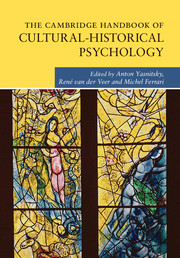16 results
Part I - Theory
-
- Book:
- The Cambridge Handbook of Cultural-Historical Psychology
- Published online:
- 05 October 2014
- Print publication:
- 30 September 2014, pp 7-98
-
- Chapter
- Export citation
Contents
-
- Book:
- The Cambridge Handbook of Cultural-Historical Psychology
- Published online:
- 05 October 2014
- Print publication:
- 30 September 2014, pp v-vii
-
- Chapter
- Export citation
Part II - Method
-
- Book:
- The Cambridge Handbook of Cultural-Historical Psychology
- Published online:
- 05 October 2014
- Print publication:
- 30 September 2014, pp 99-174
-
- Chapter
- Export citation
Index
-
- Book:
- The Cambridge Handbook of Cultural-Historical Psychology
- Published online:
- 05 October 2014
- Print publication:
- 30 September 2014, pp 529-533
-
- Chapter
- Export citation
The Cambridge Handbook of Cultural-Historical Psychology - Title page
-
-
- Book:
- The Cambridge Handbook of Cultural-Historical Psychology
- Published online:
- 05 October 2014
- Print publication:
- 30 September 2014, pp iii-iii
-
- Chapter
- Export citation

The Cambridge Handbook of Cultural-Historical Psychology
-
- Published online:
- 05 October 2014
- Print publication:
- 30 September 2014
Introduction
-
-
- Book:
- The Cambridge Handbook of Cultural-Historical Psychology
- Published online:
- 05 October 2014
- Print publication:
- 30 September 2014, pp 1-6
-
- Chapter
- Export citation
Tables
-
- Book:
- The Cambridge Handbook of Cultural-Historical Psychology
- Published online:
- 05 October 2014
- Print publication:
- 30 September 2014, pp x-x
-
- Chapter
- Export citation
Figures
-
- Book:
- The Cambridge Handbook of Cultural-Historical Psychology
- Published online:
- 05 October 2014
- Print publication:
- 30 September 2014, pp viii-ix
-
- Chapter
- Export citation
Contributors
-
-
- Book:
- The Cambridge Handbook of Cultural-Historical Psychology
- Published online:
- 05 October 2014
- Print publication:
- 30 September 2014, pp xi-xii
-
- Chapter
- Export citation
Part IV - Language and culture
-
- Book:
- The Cambridge Handbook of Cultural-Historical Psychology
- Published online:
- 05 October 2014
- Print publication:
- 30 September 2014, pp 245-312
-
- Chapter
- Export citation
Part VI - Beyond psychology
-
- Book:
- The Cambridge Handbook of Cultural-Historical Psychology
- Published online:
- 05 October 2014
- Print publication:
- 30 September 2014, pp 401-528
-
- Chapter
- Export citation
Copyright page
-
- Book:
- The Cambridge Handbook of Cultural-Historical Psychology
- Published online:
- 05 October 2014
- Print publication:
- 30 September 2014, pp iv-iv
-
- Chapter
- Export citation
The Cambridge Handbook of Cultural-Historical Psychology - Half title page
-
- Book:
- The Cambridge Handbook of Cultural-Historical Psychology
- Published online:
- 05 October 2014
- Print publication:
- 30 September 2014, pp i-ii
-
- Chapter
- Export citation
Part V - Brain
-
- Book:
- The Cambridge Handbook of Cultural-Historical Psychology
- Published online:
- 05 October 2014
- Print publication:
- 30 September 2014, pp 313-400
-
- Chapter
- Export citation
Part III - Child
-
- Book:
- The Cambridge Handbook of Cultural-Historical Psychology
- Published online:
- 05 October 2014
- Print publication:
- 30 September 2014, pp 175-244
-
- Chapter
- Export citation

